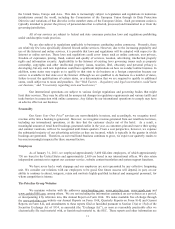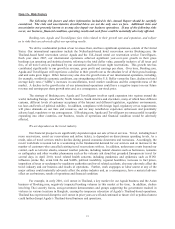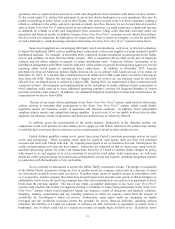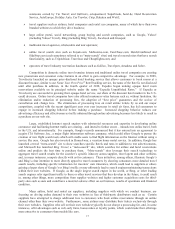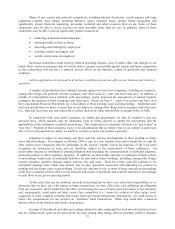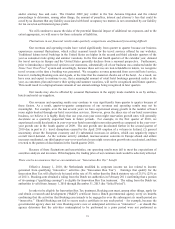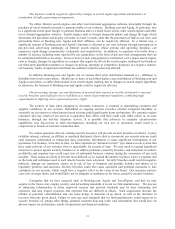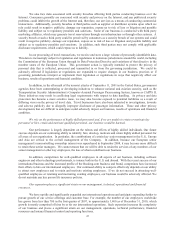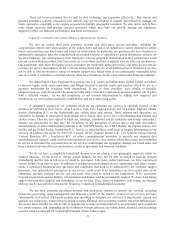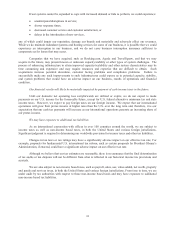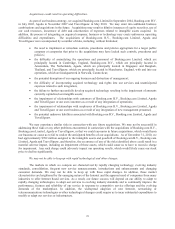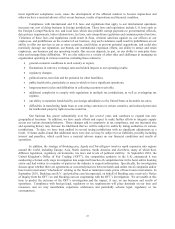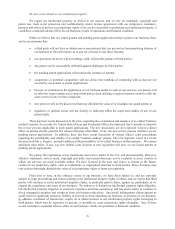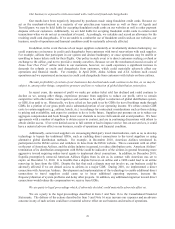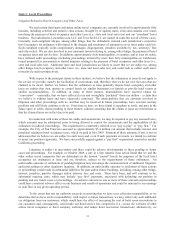Priceline 2010 Annual Report Download - page 95
Download and view the complete annual report
Please find page 95 of the 2010 Priceline annual report below. You can navigate through the pages in the report by either clicking on the pages listed below, or by using the keyword search tool below to find specific information within the annual report.21
Our business could be negatively affected by changes in search engine algorithms and dynamics or
termination of traffic-generating arrangements.
We utilize Internet search engines and other travel demand aggregation websites, principally through the
purchase of travel-related keywords, to generate traffic to our websites. Booking.com and Agoda, in particular, rely
to a significant extent upon Google to generate business and, to a much lesser extent, other search engines and other
travel demand aggregation websites. Search engines such as Google frequently update and change the logic which
determines the placement and display of results of a user’s search, such that the placement of links to our sites, and
particularly those of Booking.com, Agoda and their affiliates, can be negatively affected. In a similar way, a
significant amount of Booking.com and Agoda’s business is directed to our own websites through participation in
pay-per-click advertising campaigns on Internet search engines whose pricing and operating dynamics can
experience rapid change commercially, technically and competitively. In addition, we purchase web traffic from a
number of sources, including some operated by our competitors, in the form of pay-per-click arrangements that can
be terminated with little or no notice. If one or more of such arrangements is terminated, or if a major search engine,
such as Google, changes its algorithms in a manner that negatively affects the search engine ranking of our brands or
our third-party distribution partners or changes its pricing, operating or competitive dynamics in a negative manner,
our business, results of operations and financial condition would be adversely affected.
In addition, Booking.com and Agoda rely on various third party distribution channels (i.e., affiliates) to
distribute hotel room reservations. Should one or more of such third parties cease distribution of Booking.com and
Agoda reservations, or suffer deterioration in its search engine ranking, due to changes in search engine algorithms
or otherwise, the business of Booking.com and Agoda could be negatively affected.
Our processing, storage, use and disclosure of personal data exposes us to risks of internal or external
security breaches and could give rise to liabilities as a result of governmental regulation, conflicting legal
requirements or differing views of personal privacy rights.
The security of data when engaging in electronic commerce is essential in maintaining consumer and
supplier confidence in our services. Substantial or ongoing security breaches whether instigated internally or
externally on our system or other Internet based systems could significantly harm our business. We currently require
customers who use certain of our services to guarantee their offers with their credit card, either online or, in some
instances, through our toll-free telephone service. It is possible that advances in computer circumvention
capabilities, new discoveries or other developments, including our own acts or omissions, could result in a
compromise or breach of customer transaction data.
We cannot guarantee that our existing security measures will prevent security breaches or attacks. A party
(whether internal, external, an affiliate or unrelated third party) that is able to circumvent our security systems could
steal customer information or transaction data, proprietary information or cause significant interruptions in our
operations. For instance, from time to time, we have experienced “denial-of-service” type attacks on our system that
have made portions of our websites slow or unavailable for periods of time. We may need to expend significant
resources to protect against security breaches or to address problems caused by breaches, and reductions in website
availability and response time could cause loss of substantial business volumes during the occurrence of any such
incident. These issues are likely to become more difficult as we expand the number of places where we operate and
as the tools and techniques used in such attacks become more advanced. Security breaches could result in negative
publicity, damage our reputation, expose us to risk of loss or litigation and possible liability and subject us to
regulatory penalties and sanctions. Security breaches could also cause customers and potential customers to lose
confidence in our security, which would have a negative effect on the value of our brand. Our insurance policies
carry low coverage limits, and would likely not be adequate to reimburse us for losses caused by security breaches.
Companies that we have acquired, such as Booking.com, Agoda and TravelJigsaw, and that we may
acquire in the future, may employ security and networking standards at levels we find unsatisfactory. The process
of enhancing infrastructure to attain improved security and network standards may be time consuming and
expensive and may require resources and expertise that are difficult to obtain. Such acquisitions increase the
number of potential vulnerabilities, and can cause delays in detection of an attack, as well as the timelines of
recovery from any given attack. Failure to raise any such standards that we find unsatisfactory could expose us to
security breaches of, among other things, personal customer data and credit card information that would have an
adverse impact on our business, results of operations and financial condition.


